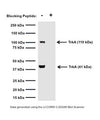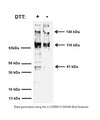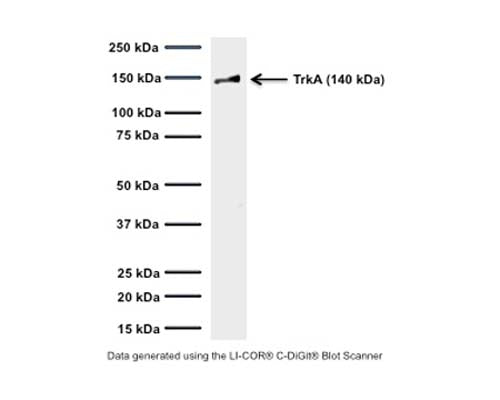Anti-Tyrosine Kinase Receptor A (TrkA) Antibody (BS292)
Our Anti-Tyrosine Kinase Receptor A (TrkA) mouse monoclonal primary antibody detects human, mouse, other mammals (predicted), and rat Tyrosine Kinase Receptor A (TrkA), and is IgG. It is validated for use in ICC, WB.






Western blot of TrkA in rat PC12 cell lysates (64 µg/lane): SDS-PAGE: denatured, non-reduced; Transfer: Tris-Glycine buffer; Membrane: nitrocellulose (0.45 um); Blocking: 5% skim milk in TBST, 1 hour at RT; Primary antibody: overnight at 4°C (3 µg/mL); Secondary antibody: anti-mouse-HRP (1/6000) 2 hours at RT; Detection: Chemiluminiscence. M-1719-100 detects membrane-associated TrkA full-length protein at approximately 140 kDa (gp140TrkA). Predicted MW of rat TrkA based on amino acid sequence: 85 kDa. The observed MW differs due to post-translational modification, mainly glycosylation.
Click on image to zoom
SKU: M-1719-100
Product Details
Tyrosine Kinase Receptor A (TrkA)
TrkA is a member of the neurotrophic tyrosine kinase receptor family. It is a membrane-bound receptor that upon neurotrophin binding, phosphorylates itself and members of the MAPK pathway. TrkA is required for high-affinity binding to nerve growth factor (NGF), neurotrophin-3 and neurotrophin-4/5 but not brain-derived neurotrophic factor (BDNF). TrkA leads to cell differentiations and may play a role in specifying sensory neuron subtypes. It has a crucial role in the development and function of the nociceptive reception system as well as establishment of thermal regulation via sweating. SUBUNIT: Exists in a dynamic equilibrium between monomeric (low affinity) and dimeric (high affinity) structures. SUBCELLULAR LOCATION: Cell membrane; single-pass type I membrane protein. Endocytosed to the endosomes upon treatment of cells with NGF. ALTERNATIVE PRODUCTS: 2 named isoforms produced by alternative splicing. Both isoforms have similar biological properties. TISSUE SPECIFICITY: Isoform TrkA-II is primarily expressed in neuronal cells. Isoform TrkA-I is found in non-neuronal tissues. Mutations in TrkA have been associated with congenital insensitivity to pain, anhidrosis, self-mutalating behaviour, mental retardation and cancer (Reference: www.uniprot.com).
IgG
Monoclonal
BS292
ICC, WB
Mouse
A synthetic peptide from the intracellular cytoplasmic domain of human TrkA (C-HGPDAKLLAGGE, aa: 604-615) has been used as the immunogen.
Human
Human, Mouse, Rat
Spin vial briefly before opening. Reconstitute in 100 µL sterile-filtered, ultrapure water. Centrifuge to remove any insoluble material. Final buffer contains no preservatives.After reconstitution divide into aliquots and store at -20°C for a higher stability. Antibody contains no preservatives. Store at 2-8°C with an appropriate antibacterial agent. Use sterile methods. Highest purity Glycerol (1:1) may be added for an additional stability when stored at refrigerated or freezing temperatures. Avoid repetitive freeze/thaw cycles.
Lyophilized
Protein G purified mouse immunoglobulin
Lyophilized from PBS, pH 7.4, containing 3% trehalose without preservatives.
WB: 1-3 µg/mL
ICC: 1-2 µg/mL
ICC: 1-2 µg/mL
WB: Western blotting: 1-3 µg/mL, antibody is suitable for reduced (with DTT or beta-mercaptoethanol) and non-reduced samples. Denatured but not reduced samples provides cleaner blot signals as demonstrated in images.
Immunocytochemistry: 1-2 µg/mL. Antibody works on 4% formaldehyde-fixed cells. Note that cells require a permeabilization step, because the antibody detects a cytoplasmic epitope of TrkA.
Other applications not yet tested.
Immunocytochemistry: 1-2 µg/mL. Antibody works on 4% formaldehyde-fixed cells. Note that cells require a permeabilization step, because the antibody detects a cytoplasmic epitope of TrkA.
Other applications not yet tested.
Unconjugated
TrkA. Does not cross-react with TrkB or TrkC. Reacts with human TrkA. Known to cross-react with TrkA from rat and mouse. Expected to cross-react with other mammalian species based on peptide antigen sequence similarity.
For research use only.
United States
12 months after date of receipt (unopened vial).
Tropomyosin-related kinase receptor; High affinity nerve growth factor receptor; Neurotrophic tyrosine kinase receptor type 1; TRK1 transforming tyrosine kinase protein; p140-TrkA; Trk-A; NTRK1; TRK
25°C (ambient)


